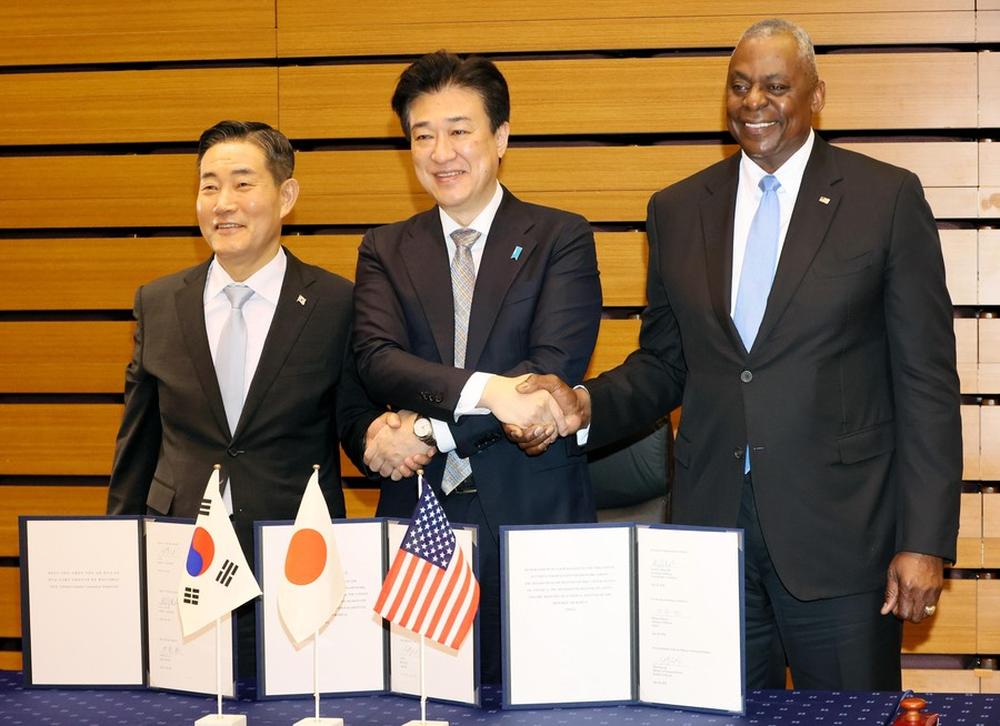
- #Japan
- #Multilateral Relations
- #US-ROK Alliance

▶ Republic of Korea is looking forward to the emergence of the Ishiba administration, which inherits the policy direction of the Kishida regime.
▶ The Ishiba’s administration in Japan could create policy dualities between the 'security sector' and 'other sectors', so ROK is concerned about this.
▶ From the perspective of 'trilateral coordination among ROK, the United States, and Japan', ROK hopes that the relationship between the two countries will develop further in the future by understanding Japan's current position and examining ROK-Japan relations.
The emergence of the Ishiba administration in Japan signifies two major developments: 1) the continuation of existing security policy direction, and 2) the coexistence of competition and cooperation. Given the differing national interests of Republic of Korea (ROK) and Japan, close observation and understanding are required moving forward.
In terms of the possibility of 'trilateral cooperation among ROK, the US, and Japan', it is essential to examine two perspectives to understand the overall situation in Japan: Japan's stance towards the US and its stance towards ROK.
Regarding Japan's stance towards the US, the following points are noteworthy. Firstly, Japan prioritizes military alignment within the region through coordination with the US, and is making efforts to secure justification for constitutional amendments towards becoming a 'Normal-State'. The US-Japan military alliance is focused on compatibility within the 'US Indo-Pacific strategy', and the ongoing systematic and skilled integration with the US forces post-war should be recognized as robust. Notably, Japan is also developing and potentially exporting weapons to many states in coordination with the US, establishing a significant domestic infrastructure for this purpose. Additionally, Japan plays a crucial role as a key forward base for the US forces in the region and a rear base for the UN Command, effectively serving to 'explain' and justify its militarization to the US.
Secondly, Japan is striving to overcome the sense of crisis caused by the proliferation of protectionist trade due to US-China tensions and the resulting fragmentation of supply chains. As a solution, Japan is repeatedly attempting to integrate into the US economic network and is taking the lead in formalizing and internationalizing agendas in various economic and high-tech fields. In fact, Japan recently attempted to acquire a 'US steel-manufacturing company', among other initiatives, including the enactment of the "Economic Security Promotion Act" in 2022, and through the 'tax reform proposal' for fiscal year 2024, it supports national subsidies in fields such as EVs, semiconductors, eco-friendly businesses, steel, and chemicals. In addition, Japan is actively participating in several international network consultative bodies such as the IPEF, CPTPP, and RCEP, further cementing its economic axis centered on the US.
Regarding Japan's stance towards ROK, the following points can be noted. Firstly, Japan hopes ROK will approach as a 'sustainable strategic cooperative partner'. In the 2024 "Defense White Paper" of Japan, Japan increased the content related to ROK, enhancing not only the trilateral cooperation with the US and ROK but also the bilateral cooperation between Japan and ROK. Here, Japan defined ROK for the first time as a 'cooperative partner and an important neighboring state'. This classification particularly highlights how Japan perceives ROK in the context of resolving regional conflicts. Japan shares perceptions with ROK on issues concerning North Korea and China and is similarly exposed to various geopolitical challenges. Japan's initiatives, such as △ restoring the GSOMIA with ROK, △ building a robust alliance in the region through cooperation with ROK, and △ resolving past disputes like the 2018 "Radar lock-on" conflict, are all part of this context.
Secondly, aside from its competition with ROK, Japan is focusing on building a cooperative relationship with ROK to stabilize supply chains. The two states have maintained active 'shuttle-diplomacy', holding twelve summits under the Kishida administration and one under the Ishiba administration. Besides competing in sectors like semiconductors, nuclear power, and defense, both states have actively exchanged in fields such as welfare, culture, climate, technology, and tourism. The geopolitical proximity, similarities, and potential for development between the two states will continue to serve as effective guides for sustaining their cooperative relationship. Particularly, both states are positioned to jointly address the likely expansion of 'Chinese-based resource control' due to US sanctions against China. It is crucial to closely observe their future steps in strengthening coordination within the IPEF-related 'supply chain crisis assessment system'.
The 'two perspectives' from Japan well illustrate the current 'situation' of ROK-Japan relations. While the emergence of the Ishiba administration may initially raise many doubts, as mentioned earlier, both states find themselves in a position where 'mutual cooperation' is necessary. They must 1) jointly secure a 'supply chain share' to prevent 'PASSING' by the US in future strategies towards the US; 2) share 'non-economic and strategic judgments' in economic fields; 3) jointly explore and recruit other regional cooperative states in preparation for US-China conflicts; 4) share the 'strategic burden' necessitated by the US; and 5) advance communication between new 'strategic command centers' in Japan and ROK, maintaining the robust 'trilateral coordination among ROK, the US, and Japan' solidified by the "Camp David Declaration".
Despite the existence of various factions within the Japan's conservative camps, for now, 'the cohesion issues within the "Jamin-Dang"(Liberal Democratic Party) of Japan' and 'Prime Minister Ishiba's security-focused moves' are likely to proceed fully. The security domain between 'Japan and ROK, along with the US' as an intermediary, is evolving from a 'choice' to an 'obligation'. Unresolved 'tensions' between the two states will continue to emerge in economic security aspects. However, it is hoped that both states will liberate themselves 'together' from the common threats and their associated sense of crisis, uninhibited by these challenges.

Joo, Dong-Jin (朱東辰) is a Research Fellow at the Institute for National Security Strategy (INSS). Dr. Joo previously served as a Research Fellow of the Institute for Global Future Strategy, SungKyunKwan University. He earned his Ph.D. in Political Science from the SungKyunKwan University. His research areas include Republic of Korea’s Multilateral Security Strategy, Strategic Scenario Making, and Foreign Policies. His recent publications include “Korea’s Foreign Policy Against North-Korea and the Strategic Triangle between North-Korea, the Unite-States, and China” (2018); “Korea’s Geopolitical Strategy and Challenges: Indo-Pacific Strategy and the Scapegoat Hypothesis” (2023).


